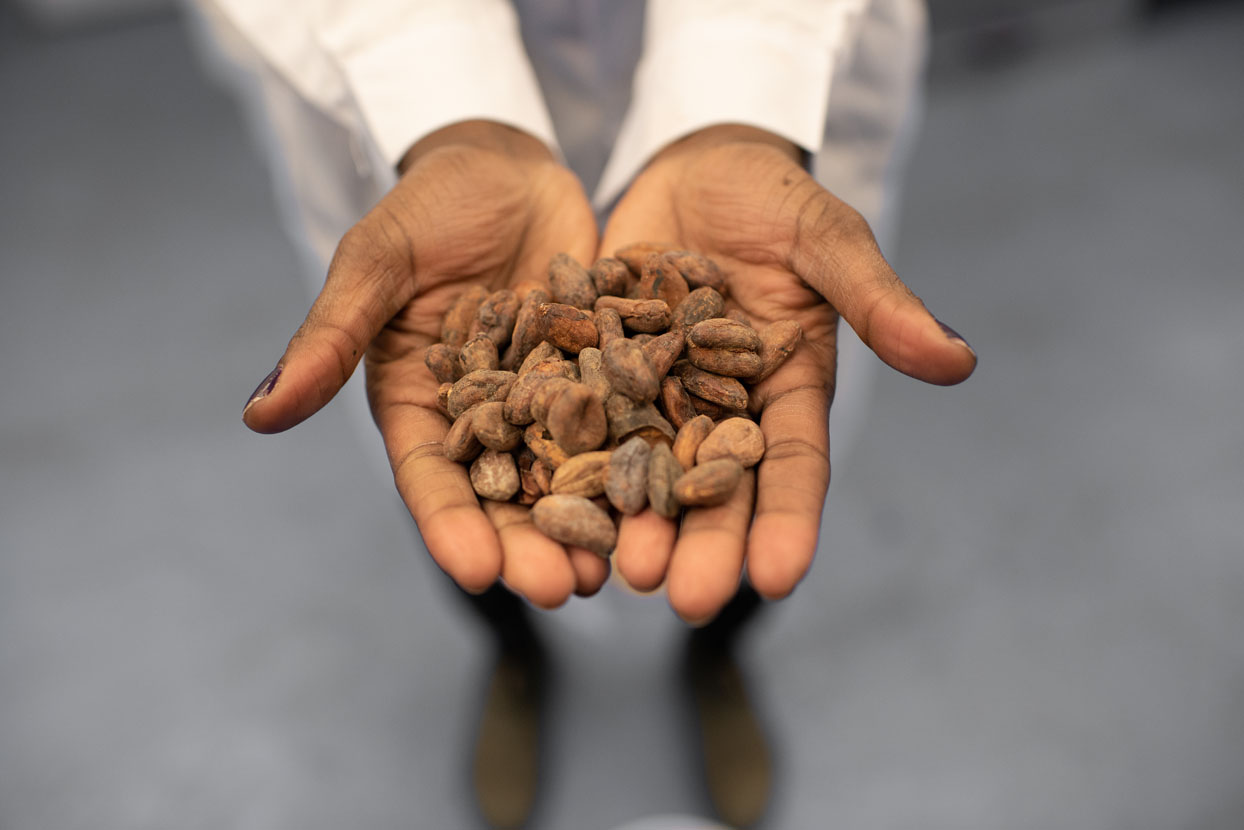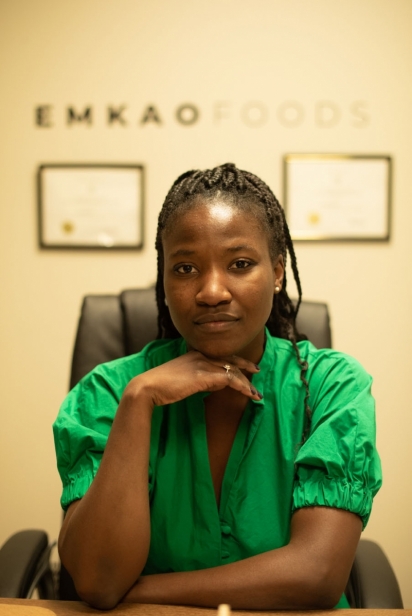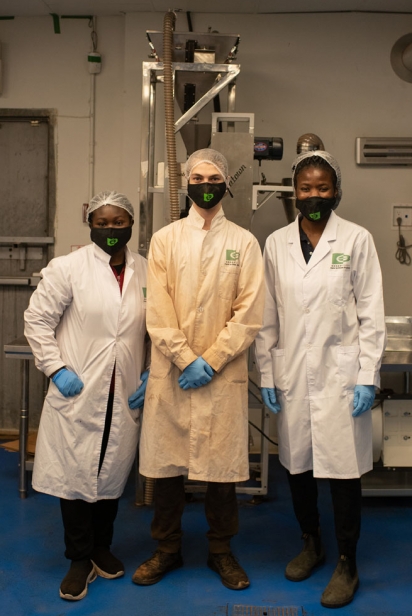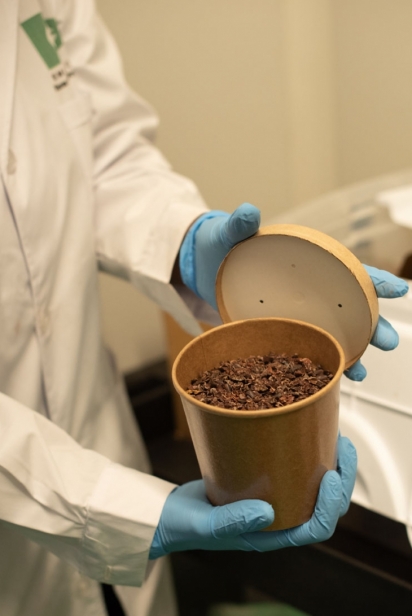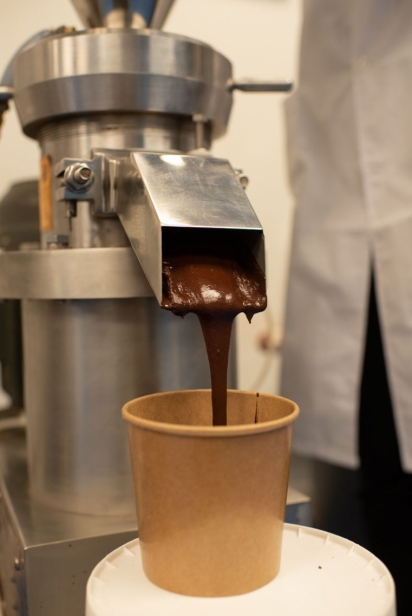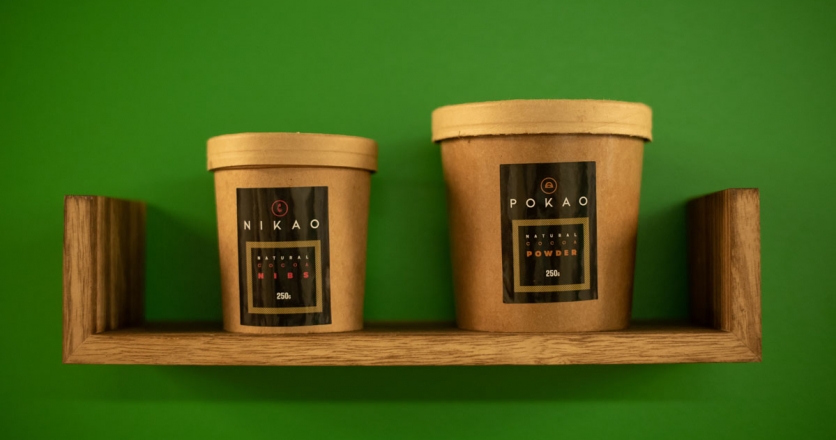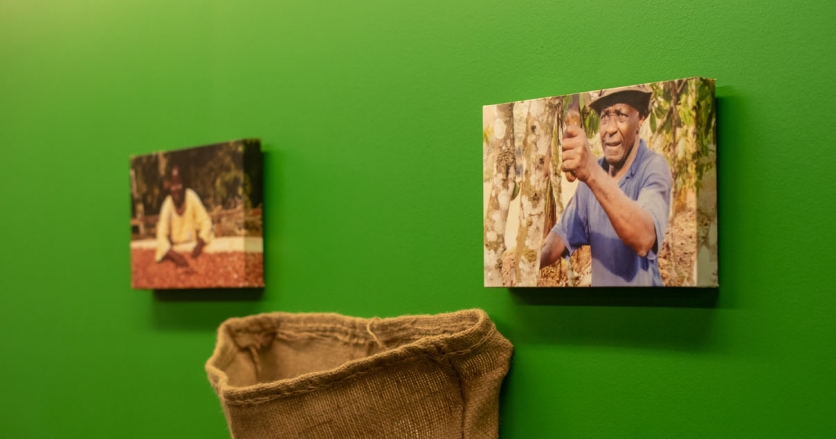Chocolate with a Higher Purpose
Ayissi Nyemba often visited Kotou Farm as a child. Oblong orange-red and brilliant yellow cacao pods were her soccer ball stand-ins, fun to kick around the forested land owned by three generations of her family in central Cameroon. People around her would say have fun, but we don’t want to see you working here.
Cacao farming is physically demanding work. Seasonal labourers typically earn $2 a day. Women, who handle a range of farm duties from cleaning the beans to sewing burlap sacks, can be economically exploited by their husbands. Without knowing the market value of their crop, small lease-hold farmers can sell their cacao for far less than it’s worth.
A $103-billion global industry begins at these farm gates. The big profits go to the multinational chocolate companies that turn raw cacao beans into bonbons and chocolate bars.
Nyemba, 32, did end up working with the organic cacao from her family’s farm, but in a way no one imagined.
As founder and CEO of EMKAO Foods, she’s one of only a handful of women on the production side of cocoa, turning cacao beans from Kotou Farm into cocoa products used by businesses in the Lower Mainland, Calgary and Montreal in a range of products, from artisanal bars to gelato. It’s the first tree-to-product factory on the west coast and Canada’s only production facility for single-sourced cocoa products.
Using her background in marketing and her passion for cacao, Nyemba is determined to transform the chocolate industry by ensuring ethically and sustainably produced, traceable cocoa products. She wants farmers to be educated about agronomy and the value of cacao and able to increase crop volume and incomes in Cameroon, and eventually, across Africa.
After studying marketing at university in Lyon, France, she trained at École Chocolat as a professional chocolatier and maître chocolatier, before coming to Canada in 2013. Nyemba completed a master’s degree in marketing at the Université de Sherbrooke in Quebec, followed by a move to Vancouver.
She started EMKAO in 2016 and opened the 3,000-square-foot production facility in a leased space in a Mission, B.C., industrial park in February 2021. Four factory staff process about 20 tonnes of cacao a year, shipped from Kotou Farm. Nyemba hopes to eventually be able to process the farm’s entire 2,000-ton harvest.
Her father, Ambela Nyemba, is her inspiration. Nyemba’s five-year-old son, Ambela, is named for him. With a PhD in agronomy, he has run the family farm for more than 25 years, ensuring labourers are treated well and paying living wages. Her father and one of her brothers also work with EMKAO. Her mother, Anne Marie Nyemba, a former professor with a PhD in chemistry, helps Nyemba on product research. Initially, she couldn’t believe what her daughter had achieved by establishing a business after only a few years in Canada.
“My mom is really shocked,” Nyemba says. “She’s like when, how? She’s speechless. She just doesn’t understand how I was able to do it. I came to Canada and didn’t even speak English when I started.”
Nyemba came up with the company name as an acronym of sorts, from “Enterprise Made for Kakao.” She spells Kakao with a “k” as she learned it in Cameroon. The faded chocolate stainson her white lab coat are a visible link to her family and the farm. EMKAO makes cocoa nibs, cocoa liquor (also called paste) and fine-ground cocoa powder. A press extracts cocoa butter, which is later blended with cocoa liquor, cane sugar and organic Madagascar vanilla to make vegan dark chocolate chips.
“Everything is good about cocoa and I love the fact that I actually can make all these extraordinary products with just one bean,” Nyemba says. “It’s a superfood and I want everybody to have access to that. I want people to understand that this is a cacao bean. This is how it’s processed. And buying from us will support those farmers. It’s not just a chocolate bar on a shelf.”
Where cacao comes from and how it is harvested is becoming increasingly important to consumers, who are beginning to question the human cost of sweet treats and demanding ethically sourced cacao. A 2015 U.S. Labor Department report found more than two million children were working in cacao, a number that has risen by 14 per cent in the last decade
Nyemba is committed to bringing transparency and change to the chocolate industry, working towards economic empowerment for women by paying female workers directly. Her business is committed to a string of goals that include education and improving life for farmers and their families in Cameroon — the world’s fifth-largest cacao grower — then across Africa’s cacao-growing nations.
“Every time somebody purchases from us, we share the margins with the cacao farmers,” Nyemba says. “I want to make sure that my customers know the names of the farmers. The farmer is my dad. It’s my mom. So, I want to make sure that they have a decent living wage.”
More than 20 Canadian companies are already using EMKAO products and Nyemba and marketing manager Olivia Sarna are working to expand that number.
Nyemba plans to add vegan milk chocolate and white chocolate chips to EMKAO’s product list soon and will expand into retail sales next year. Sample kits, including roasted cacao beans, chocolate chips, nibs and cocoa liquor, powder and butter, are available on the company website (emkaofoods.com). Products are also for sale at some local farmers’ markets.
She’d like to develop a cocoa butter cooking oil and has an eye on starting a cocoa butter skincare line. She uses it daily on her skin as well as her son’s.
EMKAO offers free factory tours on request, but Nyemba envisions a bigger experience, including a viewing catwalk over the chocolate chip-making room and a tasting lounge to try caffeine-free and antioxidant-rich cocoa husk tea and vegan hot cocoa. At home, Nyemba makes hers with cocoa liquor or powdered cocoa and coconut milk, and sweetens it with agave.
Nyemba’s business fills a gap for Canadian companies eager to make products with single-source, traceable organic cacao.
Benjamin Ernst, co-owner of Earnest Ice Cream in Vancouver, is among them. He’s also one of EMKAO’s early investors. Earnest Ice Cream is developing recipes to showcase the earthy, slightly bitter flavours of warming spices, dried fruit and florals in EMKAO’s products.
Ernst says while the chocolate he gets from suppliers now is high quality, his company has no idea what goes on at the farm where the cacao is harvested.
“It’s just wonderful to be able to have that kind of connection back to the source and for a woman of colour to be starting such an ambitious business,” Ernst says. “We think Ayissi is bringing something to the table we don’t have in locally made chocolate and we’re excited to be part of it in any way we can.”
Beth Campbell, owner and chocolate alchemist at small-batch chocolate maker Viva Cacao! in Slocan, has been using EMKAO’s cocoa paste and nibs in several of her nutritionally dense vegan chocolate bars since she met Nyemba at a B.C. trade show.
A local source for high-quality, single-sourced products is a better option, rather than relying solely on U.S. companies, she says. “Oh, she’s so smart,” Campbell says, who estimates she’ll double her 300-kilogram order next year. “It’s so needed. I absolutely love supporting another woman. I love what she’s doing.”
Campbell says EMKAO products have a unique taste and rich smell. “Cacao is like wine and has all these different flavours depending on where it’s grown and how it’s processed.”
Nyemba started EMKAO with $800,000 raised through government programs, loans and grants, as well as investors such as Ernst, using the funds to buy equipment and open the factory. The processing equipment comes primarily from China. It was hardly plug and play. Nyemba had to modify much of it. It took her a week of experimentation just to calibrate the small roasting machine with an unreliable temperature gauge to get the perfect roast profile she wanted for her beans.
Every part of the bean is used. On a typical day, fermented and sundried raw cacao beans go through a sorter to ensure uniformity and quality and then they go into the roaster. They’re cooled and placed in a winnower to remove the husks. Those are used for cocoa tea.
The beans are ground into nibs. Some are used as is. The rest is pressed into smooth cocoa liquor, extracting the rich cocoa butter in the process. That leaves a heavy disc of fat-free cocoa cake, which is broken up and finely ground to make cocoa powder.
The chocolate chips are made in the next room. Three specialized mixing machines slowly blend the cocoa liquor and cocoa butter for 24 hours or more into a smooth, glossy chocolate. Cane sugar and vanilla are added. The cooled mixture goes into a punch machine that turns out vegan dark chocolate chips. The chips are excellent; rich with cocoa butter, and bittersweet.
Beyond the taste, chocolate is a nutritional powerhouse, with minerals, antioxidants and health-boosting compounds.
Nyemba figures that when she’s testing a new product, she eats about 15 pounds of cocoa and chocolate in various forms, constantly tasting as each batch is processed. She loves everything about chocolate, she says, from the delicious taste of richly bitter cocoa liquor to its superfood properties.
Nyemba is educating the fourth generation of her family to have a connection to Kotou Farm and a love of chocolate. She plays a game with her son, listing what comes from the bean so he’ll learn the value of cocoa too. “I say, everything is good in the cocoa. You can use the husk to drink tea. You can eat the raw beans and then you can have a pure cocoa butter to use on the skin.”
Her father was born on Kotou Farm. He likes to say the farm was also born in him. “He is the reason I started because I saw all the love and work he gave to the farm,” Nyemba says. “But I didn’t see any progress. What’s the future?”
The future is a small factory in British Columbia, run by a woman with big ideas.
She wants Kotou Farm to have a role as a supplier to North American chocolate-product makers while ensuring land stewardship. An educated, well-paid workforce means sustainable growth. Perhaps there’s a tourism role for Kotou Farm visits. Co- ops could be established.
She asks herself regularly, how can she add value to the raw beans? “I want to do so much more.”
EMKAO Foods
32885 Mission Way #109, Mission, B.C.
emkaofood.com | 778.654.2556 | @emkaofoods


